Jason C. Anthony's Blog
August 1, 2013
“one of the most enthralling studies of gastronomy ever published”
One of the best reviews of Hoosh has been all but invisible. Since the day it came out in the UK’s The Independent (2/4/13), the review by Christopher Hirst has been locked away in pay-for-access online archives. It’s difficult to find even on an intensive Google search. At the risk of a cease-and-desist order, I reproduce it for you here…
“How curious that a book about frozen food should be one of the most enthralling studies of gastronomy ever published. You should know, however, that Birdseye does not get a mention. This is the story of the food that sustained or, often, failed to sustain adventurers in the natural deep-freeze of the Antarctic. Written by a man addicted to the white continent (Anthony has spent eight “summers” there), the book begins in the “heroic age” of exploration when an item called hoosh was the main form of sustenance.
Though this porridge made from melted snow and pemmican (dried fatty meat) thickened with crushed biscuit scarcely sounds the most luxurious of foods, you would never know it from the ecstatic response of some consumers. The albatross-enriched hoosh that saved members of Shackleton’s Endurance expedition was “remembered for the rest of their lives”. Other local additions included crabeater seal blubber, imaginatively described as “reminiscent of melon”, and frozen seal blood, which produced a hoosh thick enough “to stand a spoon upright”. Fried seal brains were the great gourmet treat of Antarctica (they should be “fresh and free of blood clots”).
Anthony reveals that the knowledge gained about scurvy by the Royal Navy in the 18th century had been pretty much lost by the early 20th century. It afflicted some explorers so badly they had to support their warped legs with bamboo splints. The pemmican packed by the Scott expedition lacked any antiscorbutic element while the more experienced Amundsen ensured his party had pemmican containing dried vegetables and seal-meat rations rich in vitamin C. But the main reason that the British perished is that their trek was too late in the year and took too long for the quantity of food they carried. A daily deficit of 2,000 calories meant that Scott probably lost 40 per cent of his body weight before he died.
Later expeditions were better provisioned though Antarctic nutrition retained its distinctive quality. During a 1949 expedition, an attempt to make the Portuguese salt cod stew known as bacalhau with the stock-fish supplied to sledge dogs was “an ammonia-scented failure because the fish had been repeatedly scent-marked by the huskies”. Today, the world’s most southerly cuisine is considerably improved, even enviable, especially at the French base where a midwinter feast of 19 courses took four hours to consume. Even at the US McMurdo Station, Anthony was the recipient of a dozen “illicitly-made olive, sweet potato and sourdough loaves”. But his inclusion of nine recipes from the heroic era suggests a lingering desire for jugged shag and seal tournedos.”
more awards for Hoosh
I’ve slacked on this blog for over 4 months now, and much has happened in the interim. I’ll write up some other entries regarding some Hoosh events and happenings. In terms of awards, Hoosh won the Travel category of the 2012 ForeWord Book of the Year Awards, earned a Silver in Creative Nonfiction for the 2013 Independent Publisher Book Awards, and was a finalist in Nonfiction for the 2013 Maine Literary Awards.
What has been particularly interesting about this process is that each award places Hoosh in a different category: Nonfiction, Creative Nonfiction, Travel and (for the Andre Simon Award) Food and Drink. To paraphrase Billy Holiday, if you put it all together, Hoosh has everything a good reader needs…
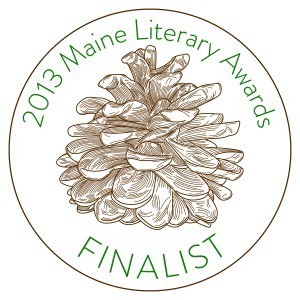

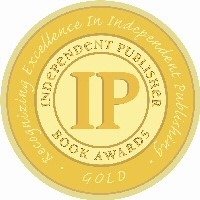
A Taste of the Past (Interview)
A Taste of the Past on The Heritage Radio Network (Linda Pelaccio, 8/1/13)
I had a fine interview today with Linda Pelaccio of A Taste of the Past. We talked about all the fun stuff: hoosh, scurvy, and keeping freshies safe and warm in your sleeping bag.
Linda Pelaccio, a culinary historian, takes a weekly journey through the history of food on A Taste of the Past. Tune in for interviews with authors, scholars and culinary chroniclers who discuss food culture from ancient Mesopotamia and Rome to the grazing tables and deli counters of today. Each week Linda explores the lively link between food cultures of the present and past.
Learn more at: www.culinaryhistoriansny.org

March 19, 2013
Hoosh wins an Andre Simon Food and Drink Book Award
2012 Winners of the Andre Simon Food and Drink Book Awards
[image error]
Hoosh has won the Special Commendation from the Andre Simon Memorial Fund, one of four awards given out in 2012 for books on food, wine, and food culture.
The Chairman, trustees and assessors of the Andre Simon Book Awards 2012 are pleased to announce the following awards.
<!--The Chairman and trustees of the <strong>Andre Simon Food and Drink book awards</strong> are delighted to announce the shortlist for the 2009 awards.</p>
<p>Many thanks to all the publishers who entered books and congratulations to all the short listed authors. <strong>The winners will be announced in the spring 2010</strong>.</p>
<p>–></p>
<ul>
<li>Food: <em>SUD DE FRANCE</em> – <strong>by Caroline Conran, </strong>published by Prospect Books</li>
<li>Drink: <em>WINE GRAPES</em> – <strong>by Jancis Robinson, Julia Harding and José Vouillamoz, </strong>published by Penguin</li>
<li>The first John Avery award: <em>POMEROL</em> – <strong>by Neal Martin, </strong>published by Wine-Journal Publishing</li>
<li>Special Commendation: <em>HOOSH</em> – <strong>by Jason C Anthony, </strong>published by University of Nebraska Press</li>
</ul>
<p><a href="http://www.andresimon.co.uk/awards_20..." target="_blank">Go to the Andre Simon Awards site</p>
<p></a></p>
February 13, 2013
What Passes For Food in Antarctica (Interview)
The Story on American Public Media/National Public Radio (Phoebe Judge, 2/13/13) 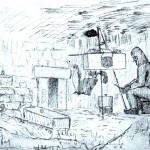
Phoebe Judge talks to author Jason C. Anthony about the food that historic explorers such as Sir Ernest Shackleton and Douglas Mawson ate to keep them going during the years of Antarctic exploration. They drew on Native American ways to dry food – a kind of ancestor to the Cliff Bar. Chocolate was and is still a crucial item.
January 2, 2013
From the Gut (Interview)
Antarctic Sun (Peter Rejcek, 12/14/12)
The most challenging part of writing the book was doing the research on a shoestring. I couldn’t afford to go to the UK to cavort in the holdings of the Scott Polar Research Institute, nor could I endlessly expand my personal Antarctic library. Luckily, I had photocopied tons of stuff years earlier when I was living in Christchurch with Nicholas Johnson (a good friend and sadly, sorely missed) and researching heavily in the various excellent Antarctic libraries there. But the secret to writing Hoosh from my desk here in Maine was the magic of the interlibrary loan. The whole world is available through your local library; all you have to do is ask, and wait.
Hoosh shortlisted for the 2012 Andre Simon Food and Drink Book Awards
2012 Food and Drink Book Awards shortlist (Andre Simon Memorial Fund)[image error]
There are so many fantastic food and wine books published each year that it is a real pleasure for all the trustees to reward the months and years of hard work by the authors, and the creativity and care lavished on them by the publishers with these awards. They are in the spirit of André Simon who did so much to encourage the enjoyment of food and wine.
…We are not looking just for ‘Cookery Book of the Year’ or ‘Food Book of the Year’ or ‘Wine Book of the Year’. So we consider in books of recipes, biographies, guides, polemical works, reference books. The list of past winners is testimony to the breadth of work that has been recognised by this award.”
December 5, 2012
Death of Antarctic writer Nicholas Johnson
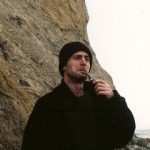
Nicholas Johnson
Nicholas Johnson, author of Big Dead Place and a close friend, took his life on November 28, 2012. Nick’s death is a heartbreaking loss to his family, to his friends, and to so many of us that knew him as an essential part of the Antarctic community. He had a voice and a spirit unlike any I’ve known, equally cynical and generous, funny and soulful. I loved him and I miss him.
No one has done more to change the way we understand Antarctica. Nick was unflinching in his critique of bureaucracy and authority in the United States Antarctic Program, but mainly he sought to create a dialogue within and about Antarctica that cut through cliche and hypocrisy in order to describe things as they really are, in all their glory and strangeness. Not all his readers realize that Big Dead Place (both the book and the website), which can be both brutally honest and explicit, is first and foremost an expression of Nick’s love of Antarctica and of the people in the USAP. He loved the place so much that he wanted to make it better. And he did. There is nothing like Nick or his writing in all of Antarctic literature or history. Not many people can say they upended a continent’s literature.
I knew Nick very well. We were happy roommates for two seasons on the ice, and we rented a flat together in Christchurch, New Zealand, for several months while for 15 hours a day we both wrote and researched in Christchurch’s Antarctic libraries. There was hardly an hour in all that time together that we weren’t talking about Antarctica, past or present. Rozo, Byrd, Shackleton flowed seamlessly through our conversations about galley food or South Pole politics. No one will ever understand my Antarctic writing – my whole Antarctic obsession, really – better than Nick. And I watched in amazement during those Christchurch months while he transformed himself from a writer of zines and broadsides into a master of narrative nonfiction.
Nicholas was his usual kind and generous self up to the very end. He and I were corresponding until just a few days before his death about this blog, of which he is the architect, and about Hoosh; I took his silence in the final days to mean he was busy with other projects. He seemed upbeat. I wish I had realized that he was so overwhelmed by the pain of living that he was making his final plans. Like every one of his many friends scattered around the world, I would have dropped everything to save Nick. But I had no idea he would do this.
I won’t talk here of what might have driven Nick to take his life. His stints as a contractor in Iraq and Afghanistan probably darkened his thoughts, and certainly he was disappointed about being blackballed from his beloved USAP, but I assume his suicide has deeper roots than that. Whatever his rationale, he was wrong. Life without Nick in it is so much poorer, so much emptier, and I can’t help but think that his demons could have been driven out if he’d shared them with the right people. But he was as guarded about his inner life as he was fair and generous in his personal life.
If you’re reading this without knowing Nick’s work, go and read Big Dead Place and explore www.bigdeadplace.com. If you don’t know American Antarctica, it will be strange going at first. It might help to be familiar with Hunter S. Thompson’s writings on American culture and politics, but Nicholas Johnson was a better writer, I think. And if you really want to understand, go wash dishes in McMurdo or operate heavy equipment at the Pole and fall in love with the place, the people, and the absurdity of life in a big dead place. At some point, you’ll think the same thing I will for the rest of my life: Hey, I really wish I could talk to Nick right now.
December 1, 2012
Antarctic Eats (New York Times Book Review)
Antarctic Eats (Rebecca P. Sinkler/New York Times Book Review)
And then there was the hunger, the persistent, maddening, gut-cramping hunger. You thought, dreamed and talked of little but food. Forget that other primal urge. The closest you got to sex was eyeballing the woman on the Land O’Lakes butter box. You would have slaughtered your favorite dog and gladly eaten it. And you would have happily devoured hoosh — a mix of dried meat, ground biscuits and whatever else was on hand, usually watered down into a revolting stew. As Jason C. Anthony puts it in the prologue to “Hoosh,” “cold, isolation and a lack of worldly alternatives have conspired to make Antarctica’s captive inhabitants desperate for generally lousy food.”
…Anthony is a fine, visceral writer and a witty observer. He paints his cast of questers with a Monty-Pythonesque brush, but balances the telling with a refusal to sneer or giggle. He demonstrates genuine respect, compassion and a kind of hopeless love for his quixotic subjects and their grandiose, miserable hungers.
November 30, 2012
Douglas Mawson, Hunger Artist (Hoosh excerpt)
“Douglas Mawson, Hunger Artist” from The Smart Set
Like the inhabitants of other former frontiers, we Antarcticans like to think that the successes, the failures, the noble or ignoble exploits of our pioneers become essential narratives for those of us who have settled in their footprints. And as I found opportunities to leave the industrial-park confines of McMurdo Station for more remote parts of the ice — camping at -25 degrees Fahrenheit on the East Antarctic ice cap, say — and then sensed the same human insignificance and fragility they experienced amid the vast Antarctic austerity, their storied past provided a literary and historic language by which to understand my experience. [image error]
And then I read the saga of Douglas Mawson, and realized all was vanity. Mawson was an Australian explorer who knew more about Antarctic suffering than most, despite that he was more scientist than adventurer. He scoffed at the fame that came with Poles, and while nationalist enough to claim a wide swath of the continent for Australia, he came to the ice seeking facts. “The polar regions,” he wrote, “may be said to be paved with facts… As surely as there is here a vast mass of land with potentialities, strictly limited at present, so surely will it be cemented some day within the universal plinth of things.”
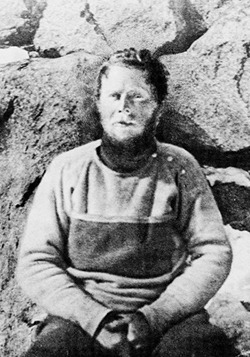
Antarctica, as it turned out, was more emptiness than facts. And a particularly empty emptiness, in the form of a deep crevasse, awaited Mawson and his comrades. After the saga that followed, from which a ruined Mawson would emerge as the sole survivor, he noted that, in the midst of his deprivation, “cocoa was almost intoxicating and even plain beef suet, such as we had in fragments in our hoosh mixture, had acquired a sweet and aromatic taste scarcely to be described… as different as chalk is from the richest chocolate cream.” Are we Mawson’s descendants or his antithesis? Either way, our lunchtime banter is trapped within an inescapable vanity: We take pride in occupying this rare and hallowed ground, but we do it by reveling in a cozy existence on a continent that could sponsor raptures over the benefits of starvation.



